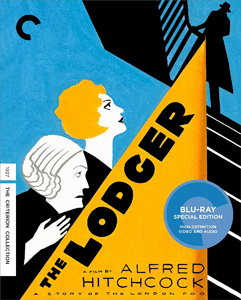It’s tempting to feel like a snooty film scholar after watching “The Lodger: A Story of the London Fog” (1927) – considered to be the best of Alfred Hitchcock’s eight preserved silent films. But while the film’s preservation is excellent, I can’t deny that my enjoyment of the HBO Max screening owes a lot to a man born after the film was released.
Australian Ashley Irwin composed the propulsive score for “The Lodger” in 1999. He carries a modern viewer through all the appropriate moods as Hitch hits his favorite beats of suspicion, fear and mob action. Compare how the inappropriately lilting music destroys a potential horror mood of “Bates Motel” (1987) with how Irwin is totally on point throughout “The Lodger” and you have each end of the spectrum.
In theaters in 1927, folks might’ve had a similar experience, as professional pianists and sometimes full orchestras played behind silent films in movie houses. But it’s interesting to note how a filmmaker would be at their mercy. Maybe because moving pictures were newer back then – and live music well-established — the images held more sway.

“The Lodger: A Story of the London Fog” (1927)
Director: Alfred Hitchcock
Writers: Marie Belloc Lowndes, Eliot Stannard, Alfred Hitchcock
Stars: June Tripp, Ivor Novello, Marie Ault
Judging “The Lodger” – based on a 1913 novel by Marie Belloc Lowndes that was adapted at least six more times after this — nearly 100 years later is perhaps ridiculous on the face of it. But I will say Hitchcock’s ability to create fast-paced momentum is remarkable. The first half-hour is slow, but the last hour is mesmerizing, primarily because he has introduced the central question: Is the titular upstairs lodger (Ivor Novello) the local serial killer known as The Avenger, or is this all a bizarre misunderstanding?
Enter the Hitchcock Blonde
The star, though, is an early “Hitchcock Blonde,” Daisy (June Tripp). All giggling aside, her blond hair is important to the plot here, because The Avenger has exclusively targeted blonde women. We see the dressing room of what plays today as an innocent enough dance hall, although I suppose it might be a burlesque house toned down for censorial purposes. One women decides that she will no longer use peroxide; another sticks dark wig curls from the sides of her hat before hitting the streets.
Tripp has a thousand-watt smile, and while it’s clear the lipstick shapes her mouth in the fashion of the time, she holds up as beautiful by modern standards. The young men – Norvello and Malcolm Keen (as Daisy’s boyfriend Joe, a police detective) – don’t fare as well.
They look ghoulish with their facial makeup. I thought perhaps the brazenness of their makeup was borrowed from theater, where someone’s expressions must project to the back row. However, Daisy’s parents – played by Marie Ault and Arthur Chesney – have normal film makeup and we can see their facial performances clearly.

The character-building seems effortless despite the lack of dialog (except for what’s shown on the screen in title cards). The lodger is a little “queer” – by the definition of the time but also perhaps by the modern definition to some degree. He doesn’t like the portraits of sexy women on his walls and asks the landlady (Ault) to remove them.
He’s a total gentleman toward Daisy, whereas Joe is possessive of her; Tripp’s performance tells us how she feels about each of the men. Although broad for the sake of the medium, everyone has recognizably human flaws, and I was very much thinking “Trust him! Trust him!” (like C-3PO says about Lando) by the time the lodger draws the police’s suspicions.
Enter another trope (Spoilers)
(SPOILERS FOLLOW.)
This is an early example of Hitchcock’s trope of the wrongly pursued man, but – similar to “The Wrong Man” three decades later — I’m not sure if “The Lodger” is honestly presenting the era or is pointedly portraying stupid police officers.
The lodger explains that the first victim of The Avenger was his sister (of whom he keeps a picture) and he’s now pursuing The Avenger around London, hoping to shoot him dead. Shouldn’t this be easy enough to check up on, even with the flow of information being what it was in 1927? Instead, Joe (perhaps revealing unprofessional pique?) arrests the lodger.
Later, an angry mob goes after the lodger and nearly kills him, thus making a viewer think “People were pretty stupid and reactionary in 1927,” but also, unfortunately, that things haven’t changed.
The biggest takeaway for me, though, is that “The Lodger” is an attention-holding, forward-charging movie, and I see why it was a hit with British cinema-goers in 1927. From a young age, Hitch knew how to engage a viewer in a story. For us coddled modern viewers, though, I have to add a tip of the newsboy hat to composer Irwin.
RFMC’s Alfred Hitchcock series reviews works by the Master of Suspense, plus remakes and source material. Click here to visit our Hitchcock Zone.

